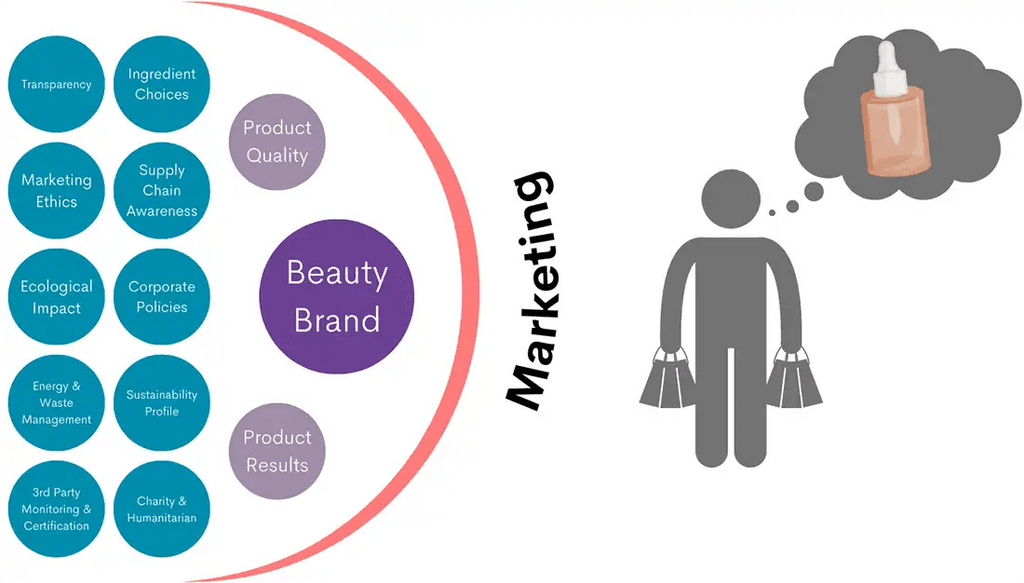The Slow Beauty Revolution: Shop Smarter for Your Skin
Written by Dr. Heather Smith without AI generated content. Links are non-affiliate.
|
✨ Ready to slow down your skincare? Explore our collection of mindful, minimalist products designed for long-term results. |
Do you ever feel like the world is moving too fast? We are so used to expecting instant gratification that we often forget to slow down and enjoy life.
According to a survey by Mental Health America, over 67% of Americans report feeling 'overwhelmed' or unable to cope with stress levels in their daily lives. Unfortunately, this sense of urgency has become ingrained into our consumer culture, leading us away from meaningful experiences towards throwaway trends.
The slow beauty movement, or slow skincare as it's also known, is an important concept for those interested in leading a more sustainable lifestyle.
By focusing on the quality rather than quantity of our beauty products, we can work towards reducing waste and cultivating mindful practices that will benefit both ourselves and the environment.
The idea behind slow beauty encourages satisfaction through mastery, offering tools and techniques to help individuals discover the power of taking one's time when seeking the balance between inner wellbeing and outer appearance.
Defining Slow Beauty
"The best things come to those who wait" is an adage that can be applied to the slow beauty movement. Increasingly, consumers are demanding products with more natural ingredients and fewer chemicals. It encourages us to take a step back from our busy lives and focus on ourselves, particularly our skincare routines and rituals. The idea of clean beauty has become increasingly popular as people feel empowered to make their own choices regarding how they treat themselves.
What is Slow Beauty?
Slow beauty is a mindful approach to skincare and wellness that values quality over quantity. It promotes long-term results, ethical production, and sustainable practices—opposing fast-paced beauty trends that emphasize instant results and overconsumption.
Slow beauty brands want to reduce throwaway culture by focusing on sustainable beauty products and calculated decision-making when shopping (read: goodbye impulse spending!).
Slow beauty isn't about sacrificing convenience; instead, it's about being mindful of what you buy and understanding why you're buying it in the first place.
Slow Beauty vs. Clean Beauty
Exploring The Clean Beauty Movement
This clean beauty movement seeks to empower conscious consumers by providing them access to sustainable brands and clean skincare routines that don't rely on wasteful packaging or unhealthy ingredients.
Although the clean beauty industry has been heavily criticized for fear-based marketing, the definition of what is a healthy ingredient should encompass not just human health. The ecosystem, aquatic environments, animal health, and humanitarian issues should all fall under a broader definition of the word "clean."
At its core, this shift towards cleaner, more sustainable products encourages people to be mindful of their purchasing decisions while still being able to enjoy luxurious spa-like experiences without contributing to throwaway culture.
With thoughtful decision-making, slow beauty becomes more than just another trend - it's a lifestyle choice rooted in responsible consumption!
Examining The Slow Beauty Movement
The slow beauty movement is about creating sustainable routines, using natural products, and engaging in slow living practices.
The emphasis is still on clean and green, but the focus shifts to the consumer. The consumer's responsibility for researching brands and ingredients is heightened in the slow beauty era.
A fan of slow beauty will be cautious with decision-making because they know they are being marketed to and that not all brands are what they seem.
As a result, purchases will be well-thought-out and calculated and not made based on impulse or emotion.
Mindfulness is key.
This means taking the time to research and find out what works best for you—whether it be homemade remedies or plant based face oils—and sticking with those items instead of changing up too often.
Slow Skincare: Benefits of a Mindful Routine
To put it simply, slow beauty takes care of both you and your environment.
These items have typically been produced with a minimalistic mindset - not just in terms of ingredients but also with regards to packaging materials and sustainability practices along the production line. By choosing these slower alternatives over mass-produced goods, we can begin to impact global consumerism habits and enjoy better quality items simultaneously.
The advantages don't stop there; many users report feeling much healthier and more confident in their skin since transitioning to slower cosmetic solutions. Not only do they use fewer chemicals on their bodies but they're taking back control by making conscious decisions regarding what goes into them.
Skinimalism
Did you know that the average woman uses 12 skincare products every single day? This statistic highlights how consumerism and throwaway culture have become deeply embedded in our daily routines. The good news is, there is an alternative way to approach beauty: Skinimalism.
Skinimalism is minimalism.
Skinimalism encourages us to use fewer products with fewer ingredients, allowing us to transform our skincare routine into something both manageable and conscious.
Natural beauty is about finding the right balance between what you need and what would simply add clutter to your life.
A person who loves the slow beauty philosophy also knows that cosmetic results are slow, no matter the formulation. They aren't tricked by marketing that promises completely impossible results.
Conscious Consumerism vs Throwaway Culture
Many of us are infected with the idea that something new will make us feel better, but all this does is lead to waste and excess spending.
As slow beauty advocates, we advocate for changing how people shop. This mindset puts sustainability first when considering what to buy.
Instead of buying items just because they are trendy or cheap, focus on quality over quantity and longevity when purchasing goods.
By being mindful of what we bring into our lives and taking part in ethical consumption practices, we can reduce our carbon footprint while creating positive change.
Free samples, or subscription sample boxes, can be harmful from various perspectives such as wastefulness, plastic pollution, and impulsivity:
- These collections often include small, individually packaged samples that are quickly used up and thrown away, contributing to a culture of wastefulness.
- The packaging for these samples is often made of single-use plastic, which contributes to plastic pollution.
- The constant influx of new beauty products encourages impulse shopping and unsustainable consumption patterns.
People criticize conscious consumerism because they believe it is an inadequate solution to systemic problems and can create a false sense of moral superiority.
Conscious consumerism suggests that individuals can make a difference by making ethical purchasing decisions, but many argue that this overlooks the fact that real change requires systemic changes and larger collective actions.
We believe it's flawed to say that one person cannot make a difference.
Every individual has the potential to make an impact through their actions, such as voting, advocating for change, and supporting organizations working towards a better future. Individual actions can also inspire others and lead to collective actions that drive significant change.
Ultimately, conscious consumerism can play a role in creating positive change, but it should not be relied upon as a sole solution to complex societal issues.

How to Spot Authentic Slow Beauty Brands
Wading through marketing hype and spotting the greenwashing is tricky at first. But the more educated you get, the easier it is to spot.
The key to identifying brands that you trust lies in the transparency of the brand. While their home page might be flashy and exciting, you should be able to click to find much more in-depth pages that explain exactly what they do, how they do it, and why they do it.
Not to toot our own horn too much, but the bareLUXE approach to honesty and transparency is a good example. We are an anti-plastic brand, yet we use plastic. Our refill program saved 63% shipping weight/bulk and 33% total plastic. However, the actual impact was still really low (because we don't sell a million units a year - yet...). Then, when we realized the containers were affecting product shelf life, we cancelled the program (not a cheap decision). We explain all the details to our customers, especially how we are looking for better options!
Our marketing strategy is to find intelligent customers who trust our methods and to grow together with them.
Remember, slow beauty is another marketing term that helps classify a brand so like-minded consumers can find them. Keywords like slow beauty, green beauty, clean beauty, blue beauty, medical grade, cosmeceutical, etc. are all flags that help google match users with their search intent.
The beauty industry is too vast to function without labels, but going beyond the label is what makes a brand ethical.
It's up to the brand to demonstrate why they are labelling themself a specific way, but it's up to you to dig deeper to convince yourself they're being honest.
Best Slow Beauty Brands to Watch
These are some of the best slow beauty brands we’ve come across—each one embodies the philosophy in their own unique way:
Kindred Black is a standout slow beauty brand known for its commitment to sustainability, ethical sourcing, and zero-waste packaging. Each product is a true work of art—handcrafted, thoughtfully curated, and presented in stunning vessels that elevate the entire skincare ritual.
In Fiore fuses the elegance of French perfumery with the purity of botanical skincare, creating deeply aromatic treatments that feel like rituals. Their slow beauty ethos centers around sensuality, energy, and spiritual connection.
Inspired by the healing powers of desert plants, Good Medicine Beauty Lab creates small-batch, holistic skincare that connects body, spirit, and earth. Their slow beauty approach honors the wisdom of natural remedies and intentional self-care.
Developing A Long-Term Slow Beauty Strategy
Taking a slow approach to beauty is a long-term game. Changes might be small at first. Decisions shouldn't be rushed. Trying the "next big thing" is usually not on your to-do list, and viral TikTok trends are unlikely to impress you.
Don't just believe a brand at face value - if they say they're ethical, dig deeper to see if they can prove it.
Dr. Heather Smith developed her love for skinimalism and clean beauty years ago when she began making home remedies for her newborn's eczema. She is an expert in natural ingredients and active botanicals and has now launched bareLUXE Skincare - a full line of effective oil serums. She dedicates this blog to consumers who are researching ingredients and working to make their beauty ritual more natural and sustainable.

MEDICAL DISCLAIMER
This content is for informational and educational purposes only. It is not intended to provide medical advice or to take the place of such advice or treatment from a personal physician. All readers/viewers of this content are advised to consult their doctors or qualified health professionals regarding specific health questions. Neither Dr. Smith nor the publisher of this content takes responsibility for possible health consequences of any person or persons reading or following the information in this educational content. All viewers of this content should consult their physicians about their skincare concerns and routines.


Leave a comment